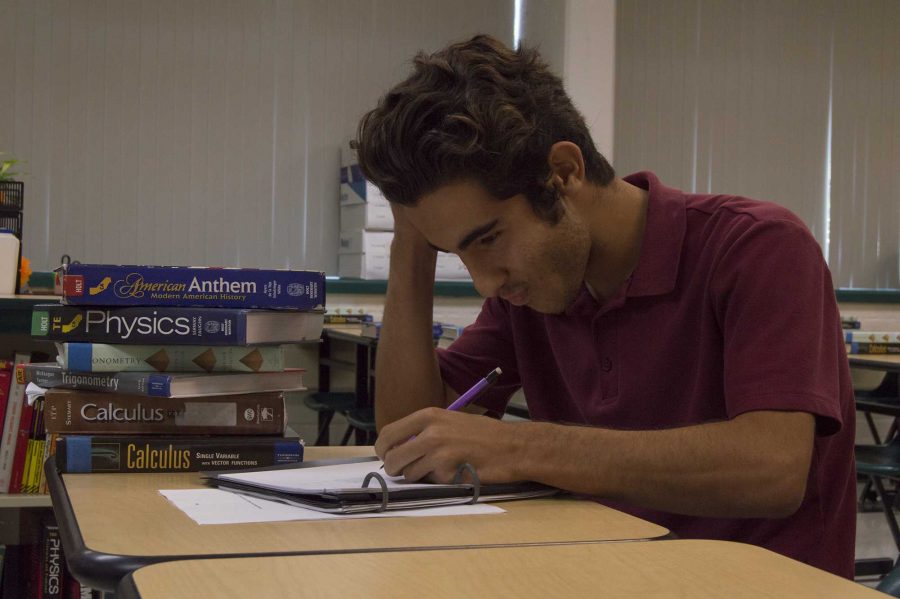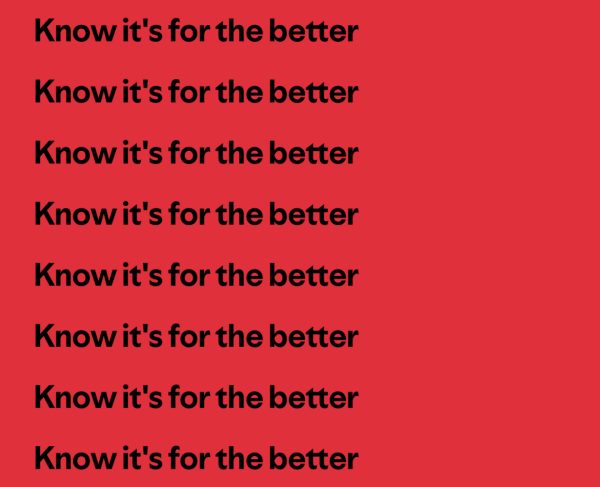Stressing the student body
Students overcome the overwhelming strain of school.
Areen Andreasian strives to complete his math work.
“Homework will be the death of me,” said junior Larisa Mkrtchyan when asked about her daily schoolwork routine. She spends about six hours a day doing her homework. She also mentioned that she has never had more stress than now, as she is taking three AP classes.
High school students face the vicious cycle of school, extracurricular activities, homework and sleep. As there are only so many hours in a day, they are expected to do so much in so little time. Since they often do not want to disappoint, they do their best to live up to the expectations given to them, but at the cost of anxiety and depression caused by stress. This stress is also heightened in students attending high schools with a more rigorous curriculum such as private schools or magnet schools.
Clark Magnet has the students’ schedules set to seven classes, which is one more period than most high schoolers take at the other Glendale Unified School District high schools. Some classes, even as early as freshman year, use textbooks that were written for college courses. The freshman class physics course uses the Conceptual Physics textbook, which is written by a university professor. This kind of reading may force students to face academic challenges that they normally would not have to face or even worry about for another few years.
Junior Sandra Gadalla said that she spends seven hours a day on average doing homework, often going to sleep at 1:30 a.m. She is currently taking AP US History and AP Biology. Gadalla said that she does not have time to do the things she wants when school is over since she spends all of her time finishing up her work. “We spend seven hours at school and seven more for homework,” Gadalla said. “Yet I’m supposed to have a life…when?”
Students have the stress of having to take many rigorous tests during the year. They range from basic daily quizzes to standardized testing required by the state. While students have more tests to take, they need to study even more to make sure they pass with an exceptional grade. Along with the hours of homework, some students put in even more time to refresh their minds by reviewing materials from previous lessons.
Students don’t only put effort into their academic work. They also participate in extracurricular activities such as clubs or sports. These activities can also be very stressful as they take up the time and energy instead of letting the student rest. One student, junior Raisa Faisal, said that she is involved in numerous extracurricular activities in addition to taking four AP classes, causing a good deal of stress for her. Faisal serves as vice president of KATS Club, volunteers at Verdugo Hills Hospital, takes Arabic classes, and functions an important member of her mosque’s youth group.
Some may be led to believe that these activities are not forced upon the students. When counselors give the freshmen advice, they say that when applying for colleges or jobs, admissions officers look for well-rounded individuals.
Sophomore Evelyn Karayan says she sometimes feels overwhelmed juggling school and extracurricular activities. “My extracurriculars take up a lot of time for doing homework and rest,” Karayan said. “There’s no time to do anything you want to by the time you get home. Sometimes I have to do my work while I eat dinner. There is just no time to myself after it’s all done.”
Jibid Cicekci, the school psychologist, helps students affected by school-related stress. “The most severe conditions I have observed in a stressed student are panic attacks, along with insomnia, nausea and shortness of breath,” Cicecki said in an email interview when asked about the different symptoms that she observes. She advised that students suffering from this anxiety should try relaxation techniques such as deep breathing exercises or set small goals to achieve to complete a larger project so that they don’t feel overwhelmed.
Sleep is also very important to living a healthy life. According to the health class textbook, the recommended amount of rest for children and teenagers is about eight and a half consecutive hours a day. Since teens have different needs and sleep patterns due the the way melatonin, a chemical in the brain that relates darkness with the need for sleep, is released in the body. Since high school starts early in the morning, the time offsets patterns in the chemical release and throws students off their healthy sleep patterns. Without rest, the brain is harmfully affected.
Loss of sleep cause the brain to forget things learned the previous day. As short-term memories are not able to become long-term memories causing memory loss. When students put many hard hours into studying, they still won’t have the cognitive power they would hope for taking an exam as they sacrifice studying for sleep.
Sophomore Daniel Solakian said that after he finishes his homework, his studying and sports, he settles down late at night to only achieve an average of four hours of sleep every night; less than half the amount needed to be a healthy growing teenager.
“I kind have gotten the hang of it,” Solakian said.

INTERESTS/HOBBIES: Music and Computer games.
EXTRACURRICULAR ACTIVITIES: Going to amusement parks and Movies with friends.
THREE WORDS TO DESCRIBE...













